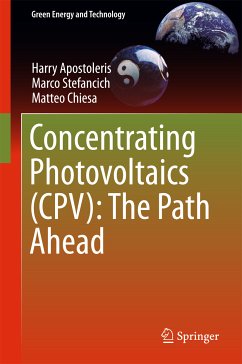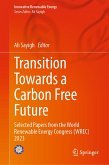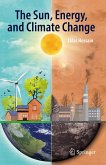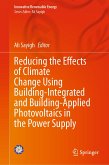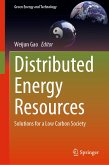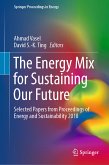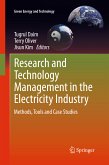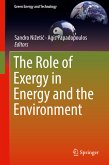Harry Apostoleris, Marco Stefancich, Matteo Chiesa
Concentrating Photovoltaics (CPV): The Path Ahead (eBook, PDF)
80,95 €
inkl. MwSt.
Sofort per Download lieferbar

40 °P sammeln
Harry Apostoleris, Marco Stefancich, Matteo Chiesa
Concentrating Photovoltaics (CPV): The Path Ahead (eBook, PDF)
- Format: PDF
- Merkliste
- Auf die Merkliste
- Bewerten Bewerten
- Teilen
- Produkt teilen
- Produkterinnerung
- Produkterinnerung

Bitte loggen Sie sich zunächst in Ihr Kundenkonto ein oder registrieren Sie sich bei
bücher.de, um das eBook-Abo tolino select nutzen zu können.
Hier können Sie sich einloggen
Hier können Sie sich einloggen
Sie sind bereits eingeloggt. Klicken Sie auf 2. tolino select Abo, um fortzufahren.

Bitte loggen Sie sich zunächst in Ihr Kundenkonto ein oder registrieren Sie sich bei bücher.de, um das eBook-Abo tolino select nutzen zu können.
Argues forcefully for the continued importance of concentrator photovoltaics (CPV) and offers a radical rethinking of the key elements of CPV Focuses on novel, low-cost approaches to optics design and manufacturing Provides a forward-thinking supplement to the traditional approach to CPV
- Geräte: PC
- ohne Kopierschutz
- eBook Hilfe
- Größe: 1.93MB
Andere Kunden interessierten sich auch für
![Transition Towards a Carbon Free Future (eBook, PDF) Transition Towards a Carbon Free Future (eBook, PDF)]() Transition Towards a Carbon Free Future (eBook, PDF)120,95 €
Transition Towards a Carbon Free Future (eBook, PDF)120,95 €![The Sun, Energy, and Climate Change (eBook, PDF) The Sun, Energy, and Climate Change (eBook, PDF)]() Eklas HossainThe Sun, Energy, and Climate Change (eBook, PDF)26,95 €
Eklas HossainThe Sun, Energy, and Climate Change (eBook, PDF)26,95 €![Reducing the Effects of Climate Change Using Building-Integrated and Building-Applied Photovoltaics in the Power Supply (eBook, PDF) Reducing the Effects of Climate Change Using Building-Integrated and Building-Applied Photovoltaics in the Power Supply (eBook, PDF)]() Reducing the Effects of Climate Change Using Building-Integrated and Building-Applied Photovoltaics in the Power Supply (eBook, PDF)96,95 €
Reducing the Effects of Climate Change Using Building-Integrated and Building-Applied Photovoltaics in the Power Supply (eBook, PDF)96,95 €![Distributed Energy Resources (eBook, PDF) Distributed Energy Resources (eBook, PDF)]() Distributed Energy Resources (eBook, PDF)104,95 €
Distributed Energy Resources (eBook, PDF)104,95 €![The Energy Mix for Sustaining Our Future (eBook, PDF) The Energy Mix for Sustaining Our Future (eBook, PDF)]() The Energy Mix for Sustaining Our Future (eBook, PDF)72,95 €
The Energy Mix for Sustaining Our Future (eBook, PDF)72,95 €![Research and Technology Management in the Electricity Industry (eBook, PDF) Research and Technology Management in the Electricity Industry (eBook, PDF)]() Research and Technology Management in the Electricity Industry (eBook, PDF)72,95 €
Research and Technology Management in the Electricity Industry (eBook, PDF)72,95 €![The Role of Exergy in Energy and the Environment (eBook, PDF) The Role of Exergy in Energy and the Environment (eBook, PDF)]() The Role of Exergy in Energy and the Environment (eBook, PDF)160,95 €
The Role of Exergy in Energy and the Environment (eBook, PDF)160,95 €-
-
-
Argues forcefully for the continued importance of concentrator photovoltaics (CPV) and offers a radical rethinking of the key elements of CPV
Focuses on novel, low-cost approaches to optics design and manufacturing
Provides a forward-thinking supplement to the traditional approach to CPV
Dieser Download kann aus rechtlichen Gründen nur mit Rechnungsadresse in A, B, BG, CY, CZ, D, DK, EW, E, FIN, F, GR, HR, H, IRL, I, LT, L, LR, M, NL, PL, P, R, S, SLO, SK ausgeliefert werden.
Produktdetails
- Produktdetails
- Verlag: Springer International Publishing
- Seitenzahl: 68
- Erscheinungstermin: 8. September 2017
- Englisch
- ISBN-13: 9783319629803
- Artikelnr.: 52943697
- Verlag: Springer International Publishing
- Seitenzahl: 68
- Erscheinungstermin: 8. September 2017
- Englisch
- ISBN-13: 9783319629803
- Artikelnr.: 52943697
- Herstellerkennzeichnung Die Herstellerinformationen sind derzeit nicht verfügbar.
Harry Apostoleris
Harry Apostoleris is a PhD candidate at the Laboratory for Energy and Nano Science at the Khalifa University of Science and Technology former Masdar Institute, in Abu Dhabi. His research focuses on novel approaches to photovoltaic and solar concentrator systems, including self-tracking solar concentrating systems (SPIE Optical Engineering + Applications, 2015) and spectrum-splitting for photovoltaics (Maragliano et al., Optics Express 2016, Apostoleris et al, SPIE Optical Engineering + Applications, 2017).
Dr. Marco Stefancich
Dr. Marco Stefancich is a senior researcher at DEWA (Dubai Electricity and Water authority) since January 2017. Previously he was a researcher at the National Research Centre, Institute of Materials for Electronics and Magnetism in Parma, Italy. He is a principal investigator in more than 10 projects with Italian, European and UAE private and publi
c entities. In 2006 he co-founded an Italian start-up company for the design, realization and installation of concentrator photovoltaics systems. Marco Stefancich has been a chair at numerous conferences on material research. He has also served as a consultant for private companies on renewable (mostly solar) energy projects (e.g. Solidia srl, "determination of expected performances of a Concentrator Photovoltaic System and design of automatic system for MPPT tracking"). Prof. Matteo Chiesa
Prof. Matteo Chiesa is the head of the LENS (Laboratory for Energy and Nano Science) at the Khalifa University of Science and Technology (former Masdar Institute). His research focuses on the creation and the establishment of technologies necessary to adapt the current energy system into a more sustainable, competitive and secure one, in particular the use of properly designed nanomaterials in low-energy systems. Prof. Chiesa scholarly co
ntribution has focused on understanding, controlling and manipulating matter at the nanoscale where chemical reactions, nucleation processes, corrosion and phase transitions originate. Specifically the effects that atmospheric moisture and the presence of nanoscale water films on surfaces have on such processes have been consistently investigated by means of purposely developed experimental techniques. Prior to joining Masdar Institute faculty in 2007, Prof. Matteo Chiesa was a Post-Doctoral research fellow at the Massachusetts Institute of Technology where he investigated the properties of nanoengineered insulating material that may play a key role in addressing the technological challenges faced by the oil industry in enhancing oil recovery while minimizing its environmental impact. This research was performed in close collaboration with the R&D department at Aibel (former ABB Offshore System) for which he previously served as a technical advisor. He was also employed at SINTEF Petroleum andEnergy, one of the largest European research institutions. He received his PhD in Applied Mechanics in 2001 from the Department of Mechanical Engineering at the Norwegian University of Science and Technology (NTNU), Norway.Introduction: Why CPV?.- Ch 1: CPV today: economic and technical status.- Ch. 2: Tracking-integrated modules for rooftop-compatible CPV.- Ch. 3: Spectral splitting - the cheap road to ultrahigh efficiency.- Ch. 4: additive manufacturing for low-cost optics.- Ch. 5: CPV in context - environmental conditions and impact on CPV performance.- Ch.6: Conclusions: the path ahead for CPV.
Introduction: Why CPV?.- Ch 1: CPV today: economic and technical status.- Ch. 2: Tracking-integrated modules for rooftop-compatible CPV.- Ch. 3: Spectral splitting - the cheap road to ultrahigh efficiency.- Ch. 4: additive manufacturing for low-cost optics.- Ch. 5: CPV in context - environmental conditions and impact on CPV performance.- Ch.6: Conclusions: the path ahead for CPV.
